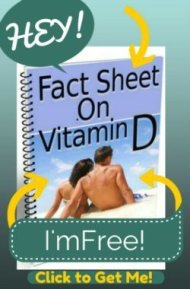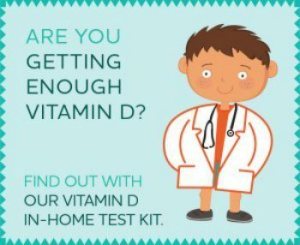Where are You Getting
Vitamin D in Winter?
Getting enough Vitamin D in Winter is challenging -if not impossible without taking vitamin d supplements, yet few people think about their Vitamin D Requirements during the wintertime. This likely explains why up to 85% of the population is Vitamin D Deficient.
Greenlanders, Diet and Vitamin D
However, most people BELIEVE that they get enough Vitamin D in Winter from 'somewhere', but few know exactly where that somewhere actually is. This myth is perpetuated by the nutritionally ignorant medical profession who continues to tell people that if they just eat a 'balanced diet' with plenty of Vitamin D Foods, then they will be able to meet all of their needs.
Yet no one has ever been able to tell me what this 'balanced diet' IS that has all of these Vitamin D Foods when even Vitamin D Enriched Foods are only intended to prevent obvious disease, and don't even significantly contribute to your vitamin D needs. In reality, if you are a Greenlander subsisting on nothing but fish, then you can meet your vitamin D needs from foods, but no one else really can. Oh, but wait, if you are a Greenlander that switches to a modern diet, like the people in This Study did, then it is back to the need for supplementation again!
And with our Vitamin D Requirements being at least 3600 IU’s per day for adults, there is simply no way that anyone living in Northern areas are meeting their Vitamin D Requirements through either foods or sun. The fact is that if you live North of 37 degrees latitude, you will be getting exactly ZERO vitamin D from the sun from approximately October through March.
That’s Right, Zero Vitamin D for nearly 6 months!
That’s Crazy, of Course there is Vitamin D in Winter…
Really, you heard me right, if you happen to live North of 37 degrees latitude, then the sun is SO FAR away from the earth, that the atmosphere actually filters out the UVB rays that produce vitamin d upon contact with your skin. If UVB rays can’t get through the atmosphere, then they can’t get to YOU and you don’t make Vitamin D.
“In the period between November and March
more than 200 minutes have to be spent
outdoor to ensure the production of
satisfactory amount of vitamin D in skin.”
'Vitamin D forming effectiveness of ultraviolet radiation from
sunlight in different months in Budapest, Hungary'
So, even if it is sunny you will NOT make Vitamin D. Researchers proved this on a beautiful sunny day in Boston when they tested the Vitamin D Blood levels of volunteers, then sent them out to sunbathe at noon when the sun was the strongest.
When the volunteers were retested, their blood levels remained exactly the same. And this study was at a relatively southerly latitude of 37 degrees (more southerly than ALL of Britain) on a sunny day. There just simply is no Vitamin D in winter for you if you live north of Boston or San Francisco.
Still don’t believe me, take a look at the chart of Figure 6 on This Research Study by Dr. Holick- one of the premier Vitamin D researchers in the world.
Don't Summertime Vitamin D Stores
Last You Through the Winter?
This is a funny question that I get asked frequently. The answer is "YES", but only IF you store Vitamin D in the summer. Most people are deficient even in the summer because we are told to stay out of the sun or we work day jobs in an office.
So the VAST majority of us get no Vitamin D in the summer, and yet we are somehow going to release these imaginary 'Stores' of Vitamin D in winter ! If you are tanned and bronzed from the sun at the beginning of winter from lifeguarding at the beach all summer, then you might actually Store Vitamin D, but if you are not a lifeguard, then its likely that you will need to Supplement with Vitamin D.
How Much Vitamin D Do You Need?
So, where are you getting YOUR vitamin d in winter? Unless you are taking supplements, it’s likely that you simply aren’t. And a regular multivitamin just is NOT going to be enough. Most multivitamins have between 200 to 800 IU’s of Vitamin D.
To give you more context of how much vitamin d you need, a study done on a team at McMurdo Station in Antarctica during the winter (where there is no vitamin D) supplemented with 2000 IU’s of Vitamin D per day, and the average blood level was 22 ng/ml (71 nm/l). This is considered very deficient according to the table on the Normal Vitamin D Levels Page, leaving these healthy adults at risk for a multitude of Vitamin D Deficiency diseases for which their Symptoms of Vitamin D Deficiency are minimal or nonexistent for years or even decades until symptoms such as Cancer or Multiple Sclerosis show up.
But since fatty fish like salmon and sardines are really your ONLY good Vitamin D Foods. Vitamin D Enriched Foods and Cod Liver Oil are simply NOT an option to meet your needs. Because of this, most people really need to be taking Supplementing with Vitamin D in winter in order to meet their Vitamin D Requirements.
Next --->
Vitamin D Requirements
Vitamin D Resources
- 5000 IU Vitamin D 3 Supplements- Vitamin D3 is really the ONLY vitamin d that you should be taking. Get Vitamin D 3 in a clinically relevant dose for adults
- Sunshine Mist Vitamin D Spray- This Vitamin D3 is GREAT for kids. Just a spray a day is all it takes.
- The Vitamin D Solution: A 3-Step Strategy to Cure Our Most Common Health Problem- Take a look at this EYE OPENING book. This fascinating account of the health benefits of Vitamin D will keep you turning pages far into the night!
Back to Top of Vitamin D in Winter
Back to Easy Immune Health Home Page




